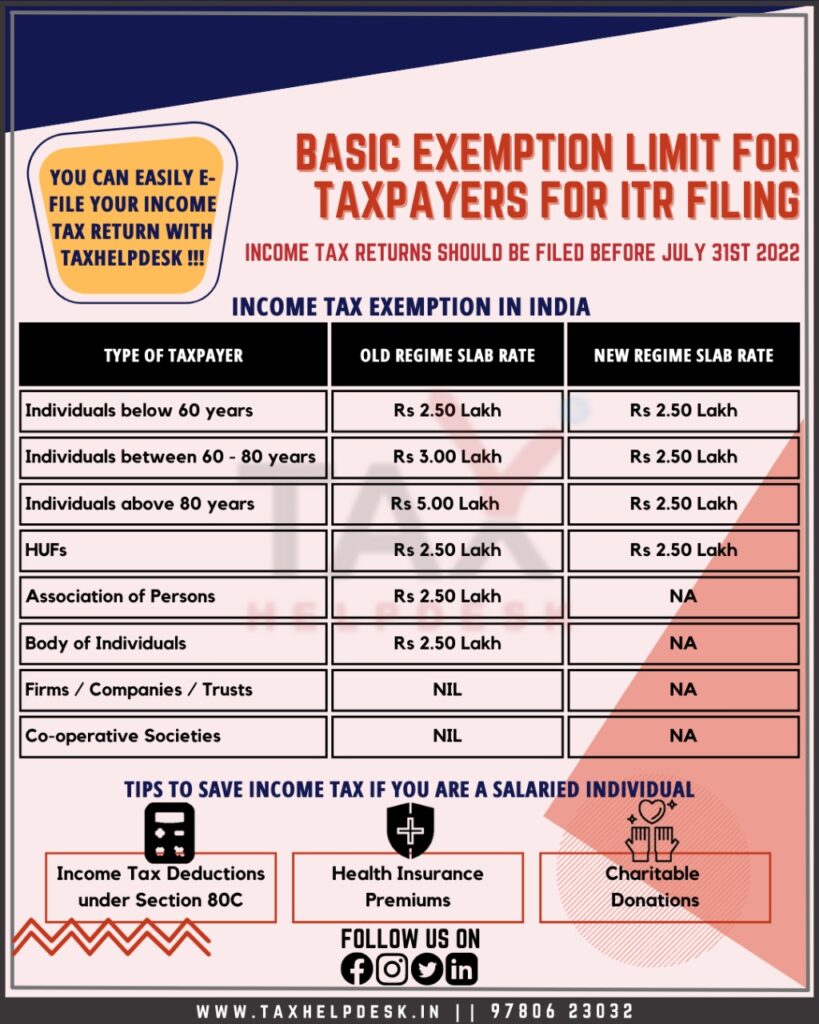The ITR filing in India exemption limit depends upon the type of taxpayer as well as the type of tax regime he chooses to opt for. This is so because the exemption limits for each type of taxpayer are different.
What is the ITR filing exemption limit
The ITR filing exemption limit for the taxpayers and as per the old and new tax regime is as follows:

Reasons for different ITR filing exemption limit
As already stated above, the ITR filing exemption limits are different for each type of taxpayer. This exemption limit is further, different for taxpayers choosing between the old tax regime and the new tax regime. On one hand, under the old tax regime, for Individuals, the ITR exemption limit varies as per the exemption limit. On the other hand, under the new tax regime, the ITR exemption is the same for all age groups. Further, under the old tax regime, the income tax slabs are high but the assessee can claim all the exemptions, allowances as well as deductions. But, under the new tax regime, while the Income Tax Slabs are low, the assessee cannot claim all the exemptions, deductions as well as allowances. Accordingly, the ITR filing exemption limits are also different for each taxpayer.
Also Read: Income Tax Slabs under Old and New Tax Regime
Note:
Only individuals and HUFs can opt for the new tax regime.
Is it mandatory to file ITR if your income exceeds the exemption limit?
The assessee has to file return if his income after all the allowances, exemptions and deductions exceeds the ITR filing exemption limit. Therefore, it is mandatory to file the Income Tax Return if your income exceeds the exemption limit.
Also Read: Do I need to file Income Tax Return?
Should you file ITR even if income is below the exemption limit?
As a general rule, it is not necessary to file Income Tax Return if the income is below the exemption limit. However, it is still advisable to file it as there are various benefits of ITR online filing like claiming a refund, carrying forward losses, etc.
Further, there are some cases wherein even if the income is below the ITR filing exemption limit, still the assessee has to file its ITR. These cases are as follows:
– The business turnover is more than Rs. 60 lacs
– The professional receipts exceed Rs. 10 lacs
– The total collection of TDS/TCS is Rs. 25,000 or more
– Assessee has made total deposits in one or more savings accounts of Rs. 50 lacs or more
– Assessee has made total deposits in one or more current accounts of Rs. 1 crore or more
– There are foreign expenses of Rs. 2 lacs or more
– The assessee has any asset outside India
– Lastly, the electricity expenses are Rs. 1 lacs or more
Please note that the above amounts are in aggregate and apply to the relevant financial year.
The last date to file Income Tax Return for the Assessment Year 2022-23 is 31st July, 2022. In case of any doubts wrt ITR, book consultation with TaxHelpdesk Experts today!
Now, you can join our Telegram Group here!


